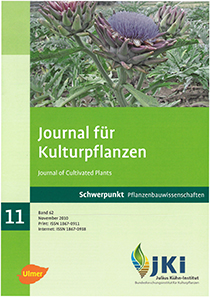Approach for determining the eco-efficiency of sugar beet cultivation in Germany
DOI:
https://doi.org/10.5073/JfK.2010.11.03Keywords:
Eco-efficiency, sugar beet, farm survey, indicators, white sugar yield, energy input of tillage, N fertilizer rate, pesticide use index, soil tare, Beta vulgaris L.Abstract
The eco-efficiency concept, originally developed as a business model, seems also appropriate to point out options for sustainable development in crop production. Thus, the study aimed to introduce a system of indicators in order to describe the current eco-efficiency of sugar beet cultivation. In addition, the relation between production intensity and yield performance of sugar beet was analyzed.
In Germany, sugar beet cultivation of 109 farms with 232 fields in 2004 was surveyed across all growing areas. In our study, the operations tillage, fertilizer application, plant protection and harvest were considered. Energy input of tillage, N fertilizer rate, standardized treatment index of pesticide use and soil tare were used to reflect production intensity and environmental impact. These indicators were related to yield performance, i.e. white sugar yield (WSY) and aggregated to an index. This index reveals the range of eco-efficiency of sugar beet production in Germany in 2004.
On the field level, energy input of tillage, N fertilizer rate, standardized treatment index, soil tare and WSY (6-15 t ha-1) were highly variable. Therefore, eco-efficiency varied considerably, too. A positive relation was given between soil tare and WSY. However, energy input of tillage, N fertilizer rate and standardized treatment index did not correlate with WSY. It was thus proved that WSY was independent of production intensity. But the effect of the farm (including crop management, site, weather, soil and their interactions) on WSY was highly significant.
In the short run, the most effective way to increase eco-efficiency is to reduce production intensity, which is not necessarily associated with a yield decrease. In the long run, continuously increasing yield will continuously enhance eco-efficiency of sugar beet cultivation.
Published
Issue
Section
License
The content of the journal is licensed under the Creative Commons Attribution 4.0 License. Any user is free to share and adapt (remix, transform, build upon) the content as long as the original publication is attributed (authors, title, year, journal, issue, pages).
The copyright of the published work remains with the authors. The authors grant the Journal of Cultivated Plants, the Julius Kühn-Institut and the OpenAgrar repository the non-exclusive right to distribute and exploit the work.







